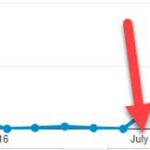Reading Time: 2 min It feels hard for me to believe, but today is the 20th anniversary of the first release of WordPress (you can see the initial announcement here). The story of WordPress actually began earlier, with a project called b2/cafelog in 2001. It was a similar product that was essentially abandoned by its creators, so Matt Mullenweg […]
WordPress
10 Years of Meetup
Reading Time: 2 min Back in February of 2012, I attended WordCamp Atlanta for the first time (and that old site is still up!). During that weekend I met some incredible folks, but the most immediately impactful was Kathy Drewien. We kinda, sorta, vaguely knew each other, and were able to talk more there. She knew I lived in […]
The right way to forward URLs
Reading Time: < 1 min When it comes to forwarding addresses on your website, there are a few different scenarios to consider. First you have the “always forwarded” pieces like I shared a few years ago, to catch special URLs or typo domains. The other scenario is when you build a new website to replace your old one, and want […]
Making content that lasts
Reading Time: 2 min The odds are high that you’ll create some kind of content today, with the majority of it likely being on social media. Will it last? Seth Godin recently shared about the “cultural half-life” of ideas, and how our world is moving increasingly toward vaporous ideas that come and go as the social media algorithms move […]
Website themes are not content
Reading Time: < 1 min When building websites, people are often concerned about not duplicating content across pages or sites. While there is no specific penalty for that, if Google thinks your website has the same content as another site, one of you won’t have a chance in the rankings. So what does that mean for website themes and templates? […]
365 days of blogging
Reading Time: < 1 min While I have over 900 posts on this blog, going back as far as 2004, the last 365 posts have been published in the last 365 days. To be honest, I wasn’t sure how long I’d keep up the daily blogging habit, but it’s a year in and going strong. If you have the desire […]
Sharing the posts I write
Reading Time: 2 min Since I’ve started blogging regularly again, the way I share my posts each day has been slightly adjusted a number of times. I recently was asked for some details on that, so here you go. Before I tackle that, though, there are two important things to frame this with. First, you need to understand why […]
The magic checkbox
Reading Time: 2 min I wrote yesterday about how you should work hard not to confuse Google, and one of the things I mentioned in there was to “make sure your site isn’t doing something stupid“. While that could mean a variety of things, there is one thing that rises above pretty much all of the others, and it’s […]
How I plan out my future posts
Reading Time: 2 min Blogging daily is tough. I just passed six months and I’m going strong, but it’ll end at some point. For now, though, here is how I make it happen. Lots of ideas The biggest challenge for me is coming up with ideas. Following the idea of “long periods of thinking, short periods of writing“, actually […]
Full site editing is coming to WordPress
Reading Time: < 1 min Ever since WordPress unveiled the drag-and-drop “Gutenberg” editor a few years ago, which I use on here (and my first post with it was three years ago today), there has been talk of when it might be extended to help edit your entire site. That time is coming very soon. As of today, you can […]






